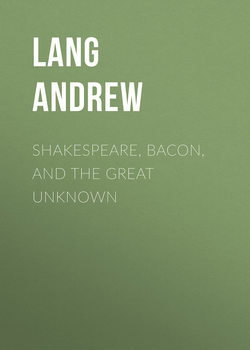Shakespeare, Bacon, and the Great Unknown

Реклама. ООО «ЛитРес», ИНН: 7719571260.
Оглавление
Lang Andrew. Shakespeare, Bacon, and the Great Unknown
PREFACE
INTRODUCTION
I. THE BACONIAN AND ANTI-WILLIAN POSITIONS
II. THE “SILENCE” ABOUT SHAKESPEARE
III. THAT IMPOSSIBLE HE – THE SCHOOLING OF SHAKESPEARE
IV. MR. COLLINS ON SHAKESPEARE’S LEARNING
V. SHAKESPEARE, GENIUS, AND SOCIETY
VI. THE COURTLY PLAYS: “LOVE’S LABOUR’S LOST”
VII. CONTEMPORARY RECOGNITION OF WILL AS AUTHOR
VIII “THE SILENCE OF PHILIP HENSLOWE”
IX. THE LATER LIFE OF SHAKESPEARE – HIS MONUMENT AND PORTRAITS
X “THE TRADITIONAL SHAKSPERE”
XI. THE FIRST FOLIO
XII. BEN JONSON AND SHAKESPEARE
XIII. THE PREOCCUPATIONS OF BACON
APPENDICES
APPENDIX I “TROILUS AND CRESSIDA”
APPENDIX II. CHETTLE’S SUPPOSED ALLUSION TO WILL SHAKSPERE
Отрывок из книги
The theory that Francis Bacon was, in the main, the author of “Shakespeare’s plays,” has now been for fifty years before the learned world. Its advocates have met with less support than they had reason to expect. Their methods, their logic, and their hypotheses closely resemble those applied by many British and foreign scholars to Homer; and by critics of the very Highest School to Holy Writ. Yet the Baconian theory is universally rejected in England by the professors and historians of English literature; and generally by students who have no profession save that of Letters. The Baconians, however, do not lack the countenance and assistance of highly distinguished persons, whose names are famous where those of mere men of letters are unknown; and in circles where the title of “Professor” is not duly respected.
The partisans of Bacon aver (or one of them avers) that “Lord Penzance, Lord Beaconsfield, Lord Palmerston, Judge Webb, Judge Holmes (of Kentucky, U.S.), Prince Bismarck, John Bright, and innumerable most thoughtful scholars eminent in many walks of life, and especially in the legal profession.. ” have been Baconians, or, at least, opposed to Will Shakspere’s authorship. To these names of scholars I must add that of my late friend, Samuel Clemens, D.Litt. of Oxford; better known to many as Mark Twain. Dr. Clemens was, indeed, no mean literary critic; witness his epoch-making study of Prof. Dowden’s Life of Shelley, while his researches into the biography of Jeanne d’Arc were most conscientious.
.....
These arguments are regarded by some Baconians as proof positive of their case.
Cuthbert Burbage, in 1635 or 1636, did not remind the Earl of what the Earl knew very well, that the Folio had been dedicated, in 1623, to him and his brother, by Will’s friends, Heminge and Condell, as they had been patrons of the late William Shakspere and admirers of his plays. The terms of this dedication are to be cited in the text, later. We all now would have reminded the Earl of what he very well knew. Cuthbert did not.
.....